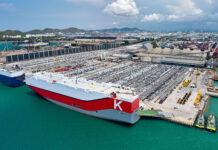
Liner operators are concerned about the US decision to remove Hong Kong’s trade privileges, which was triggered by China’s plans to impose a national security law on the territory after democracy protests.
The special trading status conferred on Hong Kong by the US is based on the United States-Hong Kong Policy Act of 1992. As part of the settlement with the UK government when Hong Kong was returned to Chinese rule in 1997, the Chinese government agreed the former British colony would have “a high degree of autonomy” for 50 years. However, since June 2019, many residents have protested against what they see as Beijing’s growing interference in the territory’s government.
The dispute could have an impact on trade out of China and Hong Kong. Although Taiwan’s Yang Ming Marine Transport Corporation’s chairman, Bronson Hsieh, believes that any impact will be minimal, as due to costs and other factors, Hong Kong port is increasingly losing cargo volumes to mainland Chinese ports anyway.
Hsieh noted that the global financial crisis in 2008 and the ongoing US-China trade tensions have affected container trade dynamics, and despite the Chinese government’s strategy for Hong Kong to develop its financial and technological expertise, alongside other southern Chinese cities under the Greater Bay Area plan, Hong Kong has failed to attract more container volumes.
Hsieh said that some carriers have skipped Hong Kong altogether, opting instead to go to Shenzhen and Nansha, which have seen rising volumes.
TS Lines’ chairman TS Chen said that trade tensions between the US and China are a greater cause for concern, as these affect a greater volume of cargoes. He added, “Hong Kong has been losing its attraction as a transhipment port, with the vigorous promotion of Shenzhen and Nansha.”
He noted that authorities of other Chinese ports, such as Qingdao, Ningbo-Zhoushan and Guangzhou, are pushing to ease cabotage rules to enable foreign-flagged ships to move cargoes within China. If this materialises, Hong Kong could lose most of its transhipment business.
However, a spokesman for Hong Kong-based OOCL, which is now a subsidiary of COSCO, told Container News that it is too early to determine the impact of Hong Kong’s loss of US trade privileges.
He said, “We are closely monitoring this development and will be working with our customers to prepare for any possible next steps in this kind of environment.”
HMM’s spokesman echoed those thoughts, “Rising geopolitical uncertainty in Hong Kong can lead to global instability, but it appears to be too early to specifically comment at this stage. We are closely monitoring the situation.”
China’s accession to the World Trade Organization in 2001 meant Hong Kong eventually lost its status as the world’s busiest port to Singapore and the emphasis on trade shifted to mainland China.
Martina Li
Asia Correspondent





